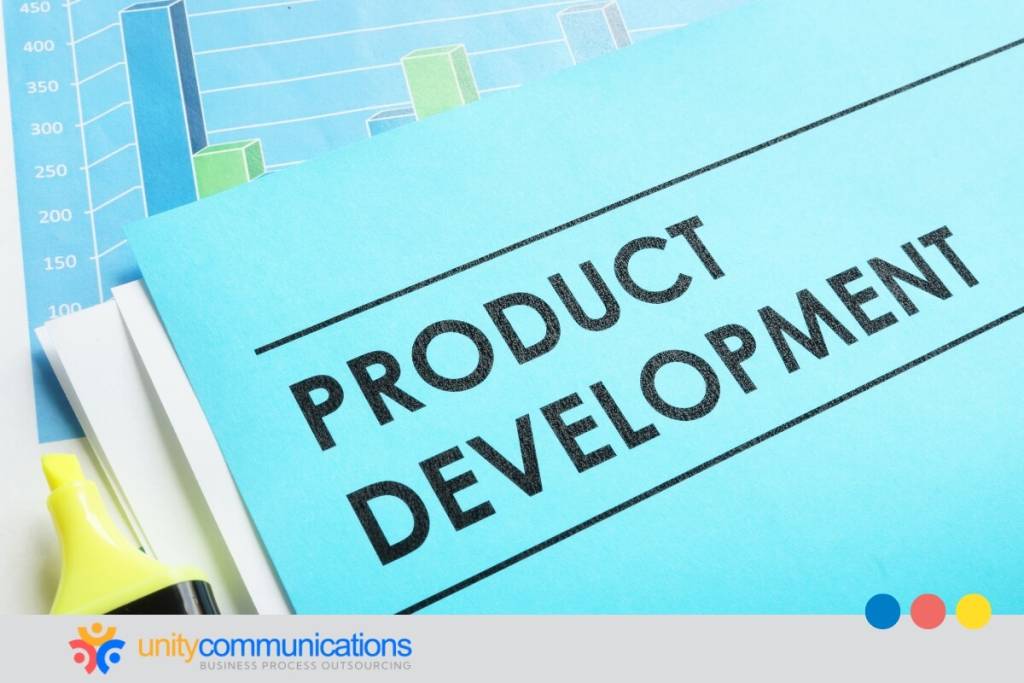IN THIS ARTICLE
Table of Contents
In the financial technology (fintech) industry, business process outsourcing (BPO) has become indispensable for product and service development.
Fintech BPO catalyzes innovation within the industry by providing essential support and expertise across various processes. Specifically, the BPO provider’s role in fintech product development encompasses many responsibilities critical to achieving success and longevity.
This article explores why product and service development is necessary for fintech firms and the vital role of the third-party provider in this process. It also discusses the challenges of outsourcing and potential solutions.
Keep reading to discover more.
Why product and service development is crucial for fintech firms

Product and service development is the cornerstone of a company’s vitality and competitiveness. In the fast-paced fintech landscape, innovation is not merely an option but a necessity for survival and growth. Here’s why product and service development is essential for fintech companies:
- Maintaining a competitive edge. In a highly competitive fintech landscape, differentiation is vital to staying ahead. Continuous development allows firms to offer unique solutions, helping them attract customers and establish industry leadership.
- Meeting customer demands. Consumer expectations evolve, and fintech businesses must adapt and develop new products and services for superior experiences. Tailored offerings nurture relationships and ensure relevance in dynamic markets.
- Adhering to regulatory compliance. Fintech firms must follow the rules to avoid penalties and preserve confidence. Developing compliance-focused solutions assures lawful operations while encouraging innovation.
- Driving revenue growth. New products and services help fintech companies improve income streams, allowing them to upsell to existing customers and recruit new ones. Diversification lowers financial risks and increases profit.
- Harnessing technological innovation. Fintech relies on tech; innovation is key to maintaining relevance. Development leverages blockchain, artificial intelligence (AI), and machine learning (ML) to create new functionalities and disruptive solutions.
- Enhancing user experience (UX). Fintech organizations focus on UX, optimizing procedures and incorporating feedback to ensure smooth interactions. Optimizing products and services according to this data increases customer satisfaction, retention, and recommendations.
- Developing partnerships and ecosystems. Fintech relies on cooperation to drive innovation and market growth. Building products and services encourages collaboration with other businesses, technology suppliers, and regulators, which increases value and drives innovation.
The BPO provider’s role in fintech product and service development
BPO organizations are pivotal. They fill different roles to complement business initiatives and catalyze innovation in fintech product and service development.
Service providers offer various outsourcing activities that enable fintech companies to concentrate on designing, developing, testing, and launching products and services. These include customer care, information technology (IT) support, data entry, and contact centers for e-commerce.
BPO partners fulfill the following roles in fintech product and service development:
Domain expertise
The BPO provider has specialized knowledge and experience. It can help design and produce innovative and market-leading fintech products and services to meet customer needs and industry demands.
Check the BPO firm’s role as domain experts in fintech product development in detail:
- Market research and analysis. Third-party firms are familiar with fintech’s intricacies and have up-to-date insights into regulations, trends, and tech. They guide client companies and effectively enhance product and service development strategies.
- Innovation. BPO experts drive innovation by exploring technological advancement, industry shifts, and customer expectations. They contribute creative solutions to fintech product and service development, fostering differentiation in the competitive market.
- Quality assurance (QA) and testing. Service providers specializing in fintech ensure product and service quality through rigorous testing. They conduct comprehensive checks, identifying and rectifying issues to meet the highest performance and UX standards.
Scalability and flexibility
A reliable BPO partner can empower firms, especially startups and small businesses, to efficiently adjust resources, features, and capabilities in response to changing demands and business requirements.
Delve into the BPO providers’ role as adaptability facilitators in fintech product development:
- Operational resilience. BPO providers ensure business continuity by designing robust systems that can withstand disruptions and scale seamlessly during growth. They implement contingency plans and disaster recovery mechanisms to minimize downtime during unforeseen events.
- Agile development methodologies. Third-party vendors embrace flexible methods, such as Scrum or Kanban, for iterative development and quick adaptation to market changes. They enable continuous feedback, helping fintech firms prioritize features and deliver updates efficiently.
- Optimal resource allocation. Outsourcing firms maximize resource distribution, scaling with demand to efficiently utilize manpower, tech, and infrastructure. They ensure seamless transitions, enabling fintech firms to maintain agility and control costs.
Cost efficiency
BPO organizations can minimize financial expenses while maximizing value and maintaining high-quality product and service standards throughout development.
Examine the BPO establishments’ role as cost-efficiency enhancers in fintech product development:
- Non-core outsourcing. Fintech firms can delegate non-core operations to service providers, including employer of record and customer support. As such, they can reduce overhead costs associated with hiring and managing in-house teams.
- Vendor management and negotiation. BPO partners coordinate relations with suppliers and negotiate attractive contracts. Using their experience and industry connections, they negotiate affordable rates, reduce procurement expenses, and improve cost efficiency through advantageous deals.
- Pricing flexibility. Flexible BPO pricing models, such as pay-per-use or subscription-based pricing, align costs with usage and demand. They allow fintech companies to scale operations without fixed overhead costs, enhancing cost efficiency.
Technology enablement
A BPO organization’s chief role in fintech product and service development is harnessing technological advancements to improve the functionality and efficiency of the client company’s offerings.
Explore the BPO firm’s role as an innovation accelerator in fintech product development:
- Technology integration. BPO partners facilitate the integration of blockchain, AI, ML, and cloud computing into fintech offerings. Capitalizing on the latest technologies enhances features, effectiveness, and innovation of fintech products and services.
- Data analytics and insights. Service providers harness the power of business intelligence tools to derive actionable insights from vast amounts of financial data. Analyzing user behavior and transactions guides fintech firms in innovating product and service design and functionality.
- Prototyping. BPO providers use unique technologies and agile approaches to enable fast fintech prototypes. They facilitate iterative design, allowing businesses to quickly explore, evaluate, and modify concepts based on user feedback.
Risk management and compliance
BPO vendors allow clients to identify, assess, and mitigate potential operational and cybersecurity threats while strengthening adherence to regulatory requirements and industry standards to minimize legal and financial liabilities.
Discover the BPO institutions’ role as safety and compliance overseers in fintech product development:
- Regulatory expertise. BPO firms fortify the fintech company’s compliance with laws and regulations. They use their knowledge and experience to advise firms on navigating complex legal landscapes.
- Compliance monitoring and reporting. BPO providers track compliance with regulatory requirements throughout product and service development. They establish robust systems to monitor adherence to standards, ensuring transparency and accountability.
- Incident response and crisis management. Third-party vendors develop crisis management plans for compliance breaches and security incidents, establishing protocols for prompt reporting and resolution to minimize the impact on operations.
Process optimization
BPO providers assist clients in analyzing and refining workflows, systems, and procedures to boost efficiency, simplify operations, and raise productivity across the development lifecycle.
Uncover the BPO organizations’ role as process optimizers in fintech product development:
- Workflow analysis. BPO firms assess product and service development processes to find inefficiencies and bottlenecks. They collect performance data and analyze patterns to identify chances for optimization.
- Collaboration across units. Service providers make working together across functions easier for different product and service development teams. They break down silos, promote cooperation, and encourage information exchange to improve handoffs, decrease coordination overhead, and speed up project delivery.
- Process standardization. External specialists standardize and record product and service development procedures to guarantee consistency and scalability. They provide methods, templates, and guidelines to simplify operations and decrease outcome variability.
Customer support and engagement
Among the BPO providers’ roles in fintech product and service development is aiding clients in resolving customer questions and concerns and gathering feedback to continuously refine and enhance product offerings.
Assess the BPO enterprises’ role as customer relationship specialists in fintech product development:
- Crisis and reputation management. BPO providers assist in addressing criticisms, managing customer complaints, and mitigating reputational risks. They handle sensitive situations with empathy and diplomacy, aiming to resolve issues satisfactorily and preserve customer trust.
- Feedback collection and analysis. Outsourcing agencies use surveys and interviews to gather valuable customer feedback regarding their experiences, preferences, and suggestions for product and service improvements.
- Community building. Service providers facilitate community-building initiatives such as forums, user groups, and knowledge bases to encourage peer-to-peer support and foster a sense of belonging among customers.
Challenges fintech firms face when outsourcing

While outsourcing product and service development to business process outsourcing companies offers many benefits, it also has several challenges that must be addressed. Below, we provide examples of obstacles and how to resolve them:
- Loss of control. Outsourcing might result in losing direct control over the development process, raising worries about quality, timeliness, and alignment with company objectives.
Potential solutions: Establish defined project objectives, needs, and timetables with the BPO partner early in development. Use agile development approaches and conduct regular progress reviews to retain visibility and control over the process.
- Intellectual property (IP) risks. Fintech enterprises might encounter IP protection issues when outsourcing product and service development to nearshore or offshore BPO providers.
Potential solutions: Establish solid contractual arrangements that include ownership rights, confidentiality restrictions, and non-disclosure agreements (NDAs). Execute extensive due diligence on the BPO provider’s security measures and compliance with IP rules and laws.
- Communication and collaboration obstacles. Language difficulties, cultural subtleties, and time zone variances can impede effective interaction between fintech companies and BPO providers.
Potential solutions: Develop strong ties with the BPO business through regular contact, virtual meetings, and site visits. To avoid confusion and assure alignment, offer precise and thorough project requirements, specs, and documentation.
- Knowledge transmission and retention. Knowledge transmission and preservation can be difficult when product and service development tasks are transferred to BPO providers, and companies risk losing institutional expertise.
Potential solutions: Build thorough knowledge transfer plans and documentation to collect and deliver essential information, procedures, and best practices to the BPO vendor. Implement cross-training and mentoring initiatives to encourage information sharing and skill development among parties.
Finding the ideal BPO partner for product and service development
In fintech’s dynamic environment, teaming up with the right BPO provider for product and service development is vital. The ideal partner brings technical expertise and shares the fintech company’s goals and values. Consider the following when seeking the appropriate collaborator:
- Industry experience and knowledge. Look for a BPO provider specializing in fintech and financial services, regulatory compliance, and fintech-specific technical advances. Their success in fintech ventures demonstrates their competence.
- Technology proficiency. Evaluate the potential BPO partner’s technical skills, including their knowledge of appropriate programming languages, frameworks, and development tools. The chosen provider should use cutting-edge technology, including blockchain, AI, and data analytics, to generate unique fintech offerings.
- QA and compliance. Ensure the BPO partner follows rigorous QA standards and adheres to industry standards and regulations. They must have robust compliance mechanisms to protect sensitive financial information from security breaches.
- Innovation and ingenuity. Look for a BPO partner that encourages disruptive thinking and creativity. It should actively contribute ideas, solutions, and insights to ensure ongoing innovation in fintech product development.
- References and recommendations. Investigate the BPO provider’s reputation, client testimonials, and case studies to determine their dependability and performance. Seek recommendations from industry peers and practitioners to ensure their credibility and suitability for a partnership.
- Location and culture. Check the BPO partner’s geographical location and cultural compatibility. While offshore providers might save money, proximity and cultural alignment can improve communication and collaboration, particularly for complex endeavors and tasks.
- Advantages in costs. Consider the cost-effectiveness of working with a BPO organization. While money is essential, it must not come at the expense of quality or reliability. Look for a BPO partner that can provide competitive prices without sacrificing service quality or project outcomes.
The bottom line

Product and service development benefits are manifold and crucial for the success of fintech firms. Businesses prioritizing continuous development efforts are better positioned to thrive in the dynamic and competitive landscape.
Collaborating with BPO providers enables firms to drive innovation, operational efficiency, and business growth. However, outsourcing poses challenges that must be carefully managed. Finding the ideal BPO partner for product and service development is critical.
Let’s connect to learn more about the BPO provider’s essential roles in fintech product development and how a third-party expert like Unity Communications can help you streamline operations and accelerate innovation!





